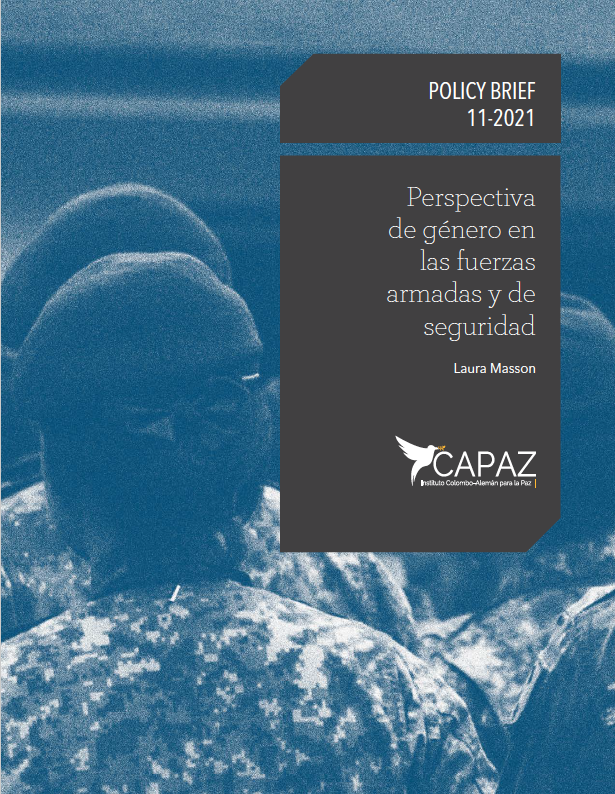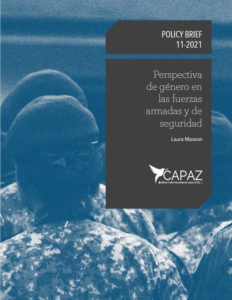
Gender Perspective and Armed Conflict in the latest CAPAZ Policy Brief
 The latest Policy Brief in the CAPAZ editorial series is entitled Gender Perspective in the Armed and Security Forces. The text was written by Laura Masson, MA, and PhD in social anthropology from the Federal University of Rio de Janeiro. Dr. Masson is a lecturer and researcher at the Universidad Nacional de San Martín (Argentina) and has specialised in gender and public policy and the feminist movement in Argentina. In recent years, she has conducted research on women in the armed forces. She is currently Director of Gender Policies at the Ministry of Defence of Argentina.
The latest Policy Brief in the CAPAZ editorial series is entitled Gender Perspective in the Armed and Security Forces. The text was written by Laura Masson, MA, and PhD in social anthropology from the Federal University of Rio de Janeiro. Dr. Masson is a lecturer and researcher at the Universidad Nacional de San Martín (Argentina) and has specialised in gender and public policy and the feminist movement in Argentina. In recent years, she has conducted research on women in the armed forces. She is currently Director of Gender Policies at the Ministry of Defence of Argentina.
This Policy Brief belongs to the CAPAZ Linea Azul, which comprises academic work related to the Comprehensive System of Truth, Justice, Reparation and Non-Repetition. (SIVJRNR).
For a full analysis and the authors’ other recommendations, see the Linea Azul Policy Brief PB10-2021 (.pdf, in Spanish)
In the Policy Brief, Masson analyses, with an empirical basis in the Argentinean case, “the implementation of gender policies in the armed and security forces”, “the possibility of permanence and integration of women and the different ways in which masculinity, as a model of identity tends to reproduce domination through mechanisms of evanescence, invisibility, and resistance”.
The author decided to analyse this issue on the basis of four axes that allow us to think about the relationship between gender and masculinity in military institutions: “i) the structural conditions of gender segregation, ii) the dual position of women in the armed forces (they are both inserted and marginalised), iii) the place of military women in the institution (command or professional corps, weapon, etc.) and iv) the forms of marginalisation/exclusion that are articulated with variables such as class and ethnic-racial affiliation”.
Thus, by studying various cases and publications, Masson sets out some lessons learned, and makes a series of recommendations that “may be useful for the professional growth of armed and security forces to discuss specific aspects of reform and propose actions”.
For example, given that “armed and security forces are mixed in most countries in the Western world, there is an need to convey a sense of urgency for gender-sensitive reform that provides the necessary tools for a form of leadership and management that involves both men and women”.
It is also “important that the highest ranks of the forces internalise the gender perspective and the benefits it brings to sustain unavoidable professional values such as discipline and cohesion in mixed groups”. It is also important to disseminate “a professional and non-stereotypical image of men and women in the media and in society in general, especially of personnel in the armed and security forces”.
Author/researcher
Laura Masson
Master and PhD in social anthropology from the Federal University of Rio de Janeiro. She is a lecturer and researcher at the Universidad Nacional de San Martín (Argentina). She has specialised in gender and public policy and the feminist movement in Argentina. In recent years, she has conducted research on women in the armed forces. She is currently Director of Gender Policies at Argentina’s Ministry of Defence.



